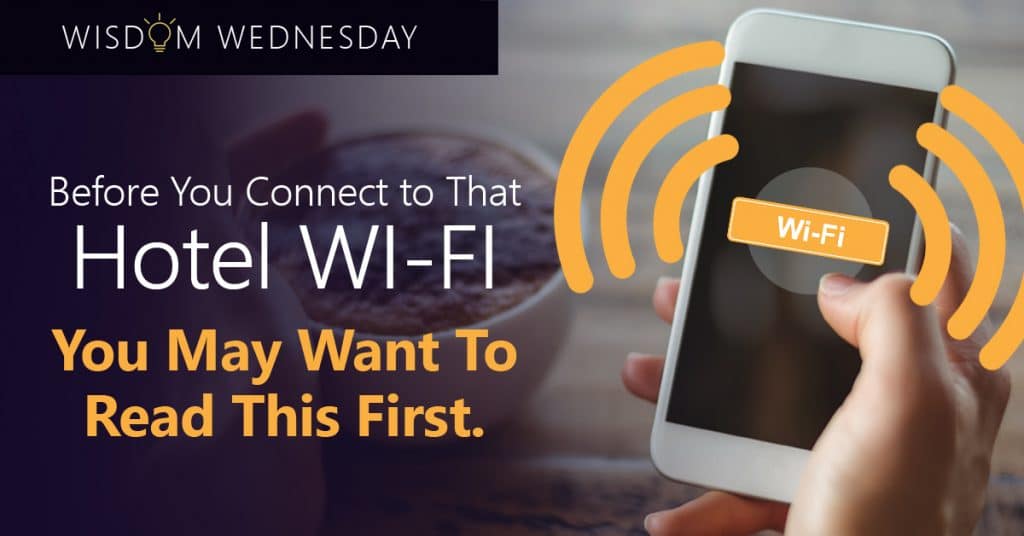-
Connect With Your Ottawa IT Service Company at (613) 828-1384
Connect With Your Ottawa IT Service Company at (613) 828-1384

Hotel wireless networks are often seen as an essential tool for business travelers. The hotel’s Wi-Fi allows you to stay connected and continue using your tablet or laptop to take your work on the road with you. Although a free Wi-Fi network is tempting, you must consider your cyber security before logging on. The tourism industry is notorious for experiencing data breaches.
Hotel Wi-Fi Vulnerabilities
The biggest problem with public Wi-Fi is anyone can snoop. Without a password, anyone can log on the network and start to Phish around for information. Before connecting to a hotel’s Internet, you may be asked to enter a hotel provided password or your room number. You may also be redirected to a screen requiring you to agree to the hotel’s terms and conditions before connecting. A common misconception is the authentication installed by a hotel helps secure your data. Although authentication limits users on the network, the process does not safeguard your information. You’re not using an encrypted network that prevents snooping.
If you do go online with open Wi-Fi, you should restrict the websites you visit. There’s a very high chance someone could track your online movements. Never enter any credentials while connected to a hotel’s wireless network. Avoid credit card transactions or logging into your online banking account. Email should be avoided too, especially if you have sensitive information within your inbox related to your job. If using the Wi-Fi is unavoidable, consider two-factor authentication on websites that allow it. An example of two-factor authentication is entering a passcode sent to your mobile phone number.
Err on the Side of Caution
Bringing your own router to a hotel may sound paranoid, but you’re better off safe than sorry. Many people log onto public wireless networks without confirming the source. According to a 2017 report from “Harvard Business Review,” the authors urged readers to stop risking their cyber security through the continued use of public networks. As evidence, they pointed out a 2016 social experiment study, which demonstrated over 1,200 attendees of the Republican National Convention accessed fake Wi-Fi hot spots. From this number, an astounding 68 percent revealed private information such as bank login details and email passwords. Hotels are infamous for falling victim to “evil twin” networks, so make sure you’re logging on the right network if you do use the hotspot. Disconnect immediately after use.
Staying Safe on the Road
Adjust the settings on your computer before going on a hotel’s wireless network. Turn on your computer’s Firewall to block any hacking attempts. Another configuration change is to disable file sharing. File sharing settings are found under “System Preferences” on Mac computers and under “Network and the Internet” on Windows systems.
An effective strategy for cyber security while traveling is to use a VPN. A VPN or virtual private network uses data-scrambling technology to protect users who want to use a remote access point. All online browsing is done on the VPN’s server. Hackers will only see that you’re on a safe and encrypted network. Companies offer VPN access to employees or you can purchase a VPN for temporary use. Alternatively, if your mobile devices can act as a personal hotspot, you can safely connect through the smartphone instead of the hotel’s network.
No matter what precautions you took while traveling, you should still change passwords after returning from a trip. Password manager tools are useful for improving and tracking passwords. Check your credit card charges closely as well upon return. Contact your credit card company if you suspect your information has been compromised.
At the end of the day, you’re better off being safe rather than sorry when using any public networks.